The major problem Western investors face in Ukraine is the availability of qualified personnel. More precisely, their absence
– What should be done to make the Ukrainian market attractive for foreign investments?
– Topchishvili: – I don't believe Ukraine is “unattractive”. On the contrary, this market has always been an interesting one for analysis, observations and “mindful” investments.
I reviewed US-based media coverage of Ukraine for the last month and found some pretty impressive numbers. The country is growing and a lot of indicators are very representative of that. For example, export of commodities increased by 25% as of the end of last year. You are ranking #1 in export of grains to the EU. Your export of agricultural products grew 20% in the first quarter of 2019 alone. Tourism as an industry grew 250% in 2018. With such growth rates, political risks don't play as dramatic a role anymore. Your risks are as high as those of any other emerging market, but potential returns can be significantly higher than any of the mature markets can offer. People understand that and are ready to work with that.
– Could you outline the issues you see as critical for foreign investors considering entering the Ukrainian market?
– There are at least five major problems that I or my colleagues have experienced firsthand. The most crucial one is human capital – or the lack thereof, to be precise. There is talent in the market but it is quite scarce for such a big country with so much potential. If we are talking about professionals with respectable track records and real experience on a global dimension, then it's practically nonexistent. And this is a gigantic problem for the market. While this problem exists in all Eastern European markets, the situation in Ukraine is far more alarming.
The reason why is because today it is not feasible for a high-level professional to work in Ukraine. A young analyst or investment banker with 5-7 years of working experience in London or New York can bring in 200K a year. And an experienced professional with a couple of exits in the western world may be looking at a seven-digit motivation package.
Unfortunately, Ukraine can't sustain such a level of compensation. It's not a minus or plus. It's a reality. It's a tough reality that will inevitably affect the new Presidential Administration when they will start searching for qualified talent. Young, successful Ukrainians either migrate/immigrate to the West or end up under the “umbrella” of powerful oligarchs. I witnessed that a lot.
– How do you see a solution?
– You need to grow and mentor your local talent, as well as develop and advance your educational and training systems. You have to build the market, and set and sustain the vector for national development and integration into the global market. In other words, Ukraine must think and care about the growth and motivation of its people.
– Now, what is the second issue Western investors face coming to Ukraine?
– A toxic reputation and negative track record among even the most successful and qualified professionals, is a huge issue. Regardless of your credentials and experience, any affiliation or association with a powerful clan or figure, or public or fiscal service, even in the past, can be seen as a red flag for western elites. I have to highlight here that I am speaking about investment activities, not your political environment.
There are plenty of examples, unfortunately. I’d prefer not to point fingers but I have to say that one very serious European Fund based in London is still waiting for the right opportunity to invest a billion dollars in the Ukrainian oil and gas sector. Thus far they have been unable to find a reputable project because teams and their leaders don’t pass the due diligence process. Who wants to take a risk investing in such a project, especially given the existing political risks? No one is looking to work with toxic people from Eastern Europe in the US either, given the scandals that are still fresh in the minds of American elites.
The market is small, unstable and unpredictable. Liquidity is almost nonexistent, which makes the market pretty dangerous territory for any non-local investor
– What are the remaining three critical issues?
– Issue # 3 is the “rules of the game.” Laws are applied selectively in Ukraine. Nepotism, preferential treatment, and everything along those lines is absolutely typical for Ukraine. Local businessmen say, “I’ll take care of it” to the western investor, for whom this specific phrase is considered a sign of something to stay away from.
Issue #4 is market liquidity. The market is small, unstable and unpredictable. Liquidity is almost nonexistent, which makes the market pretty dangerous territory for any non-local investor. That is why people tend to invest not into ventures but into infrastructure or commodities tradable outside the country, which “guarantees” returns even if the local market shrinks. In other words, if one invests in a local business, regardless of the industry (oil and gas, pharma, tech, etc.), the exit is totally unpredictable especially when local oligarchs are passive and western banks and international strategic players stay away from the market.
And issue # 5 is the banking system. This is a huge factor holding the whole economy back since from one hand, its bureaucracy tortures local businesses while not offering any actual support, access to adequate service, financial instruments, lending, etc. It’s not a banking system per se; it’s more of a controlling and punitive vehicle.
These five things are what I and my partners from the US see and experience in this market. That is not by any means some exhaustive analysis or diagnosis. It is my personal subjective outlook.
– Doesn’t the existence of “grey areas” attract and compel investors?
– Katamanze: Honestly, based on my experience, solid western businesses are pretty mindful of their reputation and they strongly prefer the long-term perspective as opposed to any immediate benefits and preferential treatments.
– Givi, would you agree?
– Topchishvili: Absolutely! It is important to understand that differences in business culture and ethics comprise one of the major factors that discourage investors. If I am investing my money, my ultimate goal is the return on my investment. So, what I expect is a critical mass of alignment with my prospective partners and ventures I’m investing in, on the cultural and ethical level. That means that law is the same for everybody and contractual arrangements and procedures are transparent and superior to some unspoken conventions such as “trust me,” “that’s how it works here,” “we paid and it will be solved,” etc.
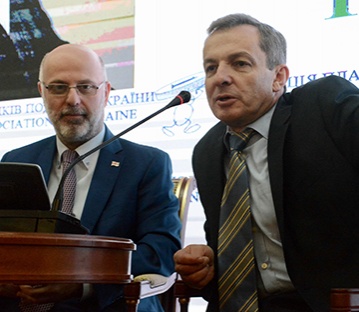 Grigol Katamadze and Givi Topchishvili. "The lack of transparency and fair treatment in Ukraine is a serious risk factor for western investors" Photo: appu.org.ua
Grigol Katamadze and Givi Topchishvili. "The lack of transparency and fair treatment in Ukraine is a serious risk factor for western investors" Photo: appu.org.uaBasically, the idea is that if I can find a way around the rules, secure preferential treatment, and create the illusion that I’m above the law by leveraging some financial instruments or connections then my competitor can theoretically do the same – in which case problems are inevitable. In simple terms, any investor is looking for fair instruments, adequate management and calculated ways to get returns on invested capital.
– So, now you are saying that this is another precondition to attract investments into the country?
– Let me tell you something: the world is pretty big and all emerging markets are competing for foreign investment. Today western investors, and US investors in particular, have an opportunity to enter a lot of markets with more or less transparent practices and rules, including South America, the Caribbean, Asia (Vietnam, Malaysia, etc.) and Africa. And those places can offer the potential of an emerging market. This is to say nothing of the investment climates of such advanced and innovative global players as Israel and Estonia.
So, yes, the lack of transparency and fair treatment in Ukraine is a serious risk factor for western investors, especially when they are surrounded by powerful and wealthy local people showing off their special relationships and “leverage” in the country.
I don’t think I can express how challenging it is for a typical businessman from a post-Soviet country to leave a positive or adequate impression on people from the circles of power in the US. What we witness is total inability of Ukrainian businessmen to have a dialogue with Congressmen, Senators and C-level executives somewhere in New York or Boston. And it does not have to do with the language barrier. It is a lack of awareness and understanding of the business culture and ethics expected and required for communication with people of a certain level in the US.
Now, as a result of all the aforementioned systemic issues, basic market instruments and institutes are either unavailable or inexistent, which makes the environment pretty unattractive for an investor. Here are those I see as the most painful:
- No market liquidity and, therefore, no capital or stock market.
- Very limited number of Funds, i.e. institutions capable of managing the portfolio and ensuring that people with adequate training and experience are making decisions and executing on them.
- Low quality of investment banking services and insufficient number of well-trained and experienced brokers.
- No systemic activities on the government level aimed at attracting financial institutions (e.g., Credit Suisse, Carlyle, JP Morgan Asset Management, Blackstone, Blackrock) into the country and creating an enabling environment for them.
As for taxation, dialogue between private and public sectors, etc., I believe Grigol, as a Head of Taxpayers’ Association, would be able to share a deeper view.
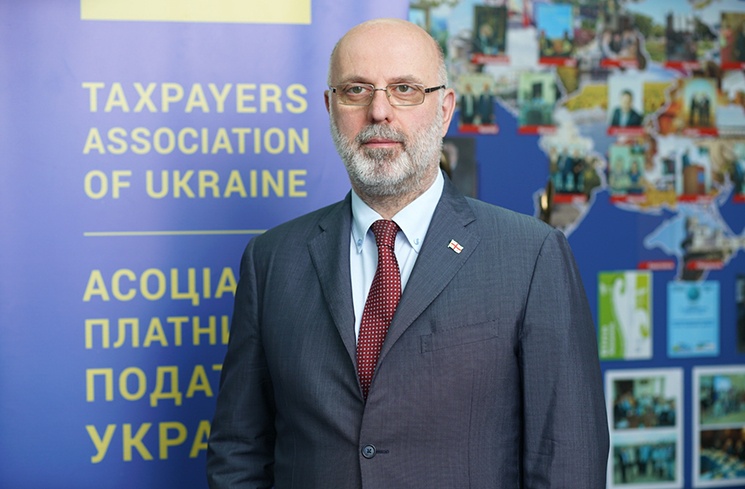 Grigol Katamadze: "Only very lazy people have not spoken about corruption in Ukraine recently. I believe we should not fight it but rather build an environment that would eradicate its roots. A new taxation system is one of the preconditions". Photo: appu.org.ua
Grigol Katamadze: "Only very lazy people have not spoken about corruption in Ukraine recently. I believe we should not fight it but rather build an environment that would eradicate its roots. A new taxation system is one of the preconditions". Photo: appu.org.ua– Grigol, we had an interview almost two years ago. You then explained in detail that Ukraine should not rely on external sources of capital because there is enough capital in the country. Based on your opinion the solution was a new Taxation Code that your Association drafted. That liberalization was supposed to boost the economy and create the environment for SME growth up to 50% of local GDP, like in the EU. Looks like your dialogue with the previous Administration did not succeed?
– Katamadze: Well, only very lazy people have not spoken about corruption in Ukraine recently. I believe we should not fight it but rather build an environment that would eradicate its roots. A new taxation system is one of the preconditions, with transparent rules and procedures as well as unified understanding among all concerned parties, including business and all branches of the government system on how to follow them. It is time to reform the taxation system. We and the business community have been speaking about it for three years now. The solution must be found once and for all. For example, we proposed replacing income tax with tax on withdrawn capital, meaning that income reinvested into business would qualify for tax exemption, while royalties and dividends would be taxable. That would be way more efficient even from a tax administration standpoint. And it works well in other countries such as Georgia and the Baltics.
I discuss this a lot with our authorities referring to their own stats where out of half a million companies registered in Ukraine only five thousand pay income tax. I encourage them to create the environment for all of them to pay taxes within this new, transparent and fair framework. Business is ready!
Now going back to the investors, if the tax on withdrawn capital works, any investor would have an incentive to keep and reinvest the capital in Ukraine, in turn growing the business and creating more jobs, which, in turn, generates more tax revenues. Both investors and the country benefit from that.
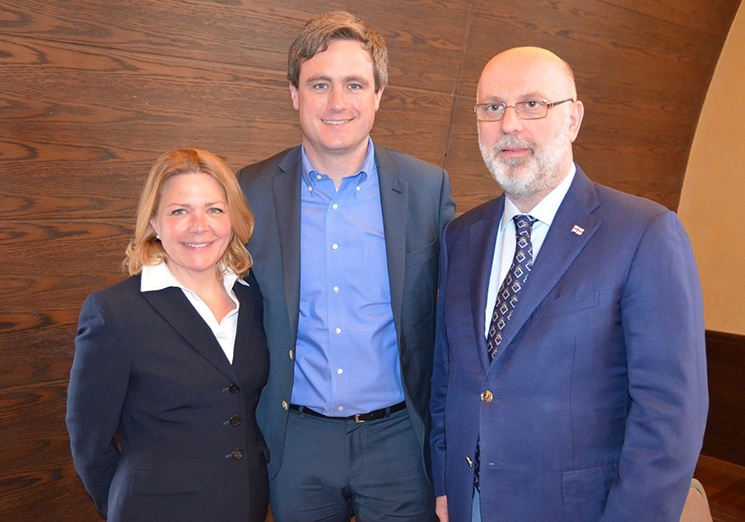 Advisor to the Minister of Finance of Ukraine Deborah Firelamb, founder of Kennedy Merchant Partners Matt Kennedy and head of the President of the Ukrainian Taxpayers Association Grigol Katamadze. Photo: appu.org.ua
Advisor to the Minister of Finance of Ukraine Deborah Firelamb, founder of Kennedy Merchant Partners Matt Kennedy and head of the President of the Ukrainian Taxpayers Association Grigol Katamadze. Photo: appu.org.ua– Well, an archaic taxation system, corruption, monopoly, lack of competence, market regulation, no justice or rule of law – these are the things Ukrainian business community complains about. Givi, as a market entry specialist bringing investors to various markets, what would you add to the list?
– Topchishvili: Unfortunately, all of that is very relevant and painful for your business community. I speak to many local businessmen and I can’t disagree with you. However, in the context of foreign investments I’d cut your list significantly because corruption, monopoly and market regulation are typical for any emerging market. It exists in the developed world as well in a very polished form. Although, such instruments as lobbying and GR are pretty transparent and legitimate ways to influence the “decision-making market.”
The issue specific to Ukraine that is most striking for foreign investors is unconcealed nepotism and lack of ethics in the war for preferential treatment. Of course, it has to do with malfunctioning justice and judicial systems. What is most surprising is that people don’t even try to hide it. They even show off, creating an atmosphere of low morale and impunity. That brings us back to a highly sensitive issue for the West – reputation. In Ukraine wealth and success give “handshakable” status to criminals, budget plunderers and well-packaged thieves.
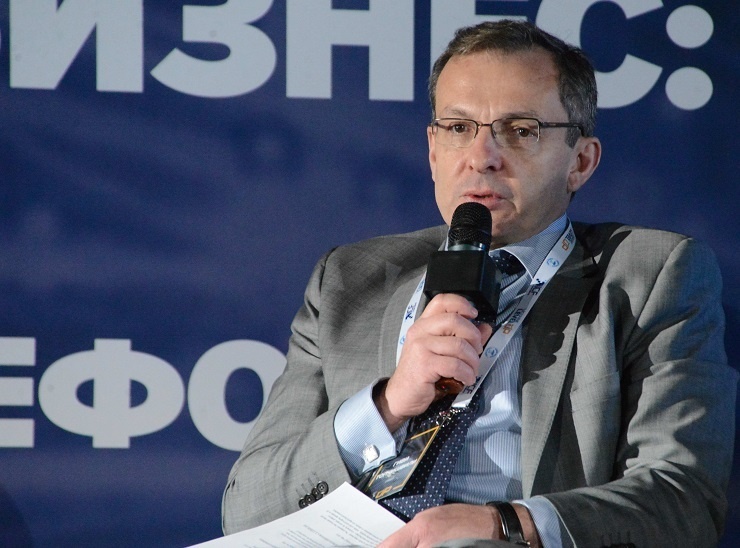 Givi Topchishvili: "I believe it should be pretty positive assuming that his Administration takes the measures that western business elites interested in the Ukrainian market are waiting for". Photo: appu.org.ua
Givi Topchishvili: "I believe it should be pretty positive assuming that his Administration takes the measures that western business elites interested in the Ukrainian market are waiting for". Photo: appu.org.ua– The diagnosis is clear. Now let’s talk about the recipe: how should the rules of the game change to make the market attractive to foreign investors?
– Topchishvili: It is important to keep doing what Grigol was doing all these years, i.e. to maintain the dialogue with the authorities delivering the messages on behalf of his team. It is critical to have actual dialogue with the government. Grigol, did you have dialogue with the previous Administration? I am referring not to meetings that took place out of respect to you personally, but rather to actual dialogue.
– Katamadze: We did have meetings but no dialogue, unfortunately.
– Topchishvili: That is exactly what the new Administration must do. It must build and stay in a dialogue with local business. That’s what foreign investors will pay attention to.
Thus far the war in the East has been, unfortunately, artificially maintained to support the interests of certain powerful clans, both in Ukraine and Russia
– How do you think the election of a President with no political background can affect the Ukrainian investment climate?
– I believe it should be pretty positive assuming that his Administration takes the measures that western business elites interested in the Ukrainian market are waiting for. We are talking not about the results we’ll see in six months but more about a vector, a direction. And what I mean by that is:
- Determination on the part of the President and his team to deliver what was promised to the people of Ukraine, i.e. tax optimization, reforms, capital amnesty, etc. They must start executing despite the growing resistance of the conservative elites.
- Resolutions that would create equal conditions for the capital to return to Ukraine. Foreign investors appreciate when local players invest with them side-by-side. It creates an extra layer of trust. However, the capital amnesty can’t happen without clearly articulated and deeply thought-through rules that would keep the country “in compliance”; otherwise, there is a risk of legalization of criminal capital.
- Avoiding biased and rushed appointments within the President’s team. A foreign investor is looking to see a balanced, professional and competent team supporting the leader of the country that would be capable of building long-term strategies and most importantly implementing them. It can’t be the President’s loyal friends, business partners, etc., even if they are very bright. Again, passionate speeches won’t help. It is about actions.
– We have been speaking for almost an hour and a half and you did not mention a war in Ukraine even once. Don’t you think it is a threat for western investors?
– Katamadze: Based on my observations and practical experience a war is not perceived as a crucial obstacle for potential investors.
– Topchishvili: For business players a war is not a prohibitive factor. Moreover, thus far the war in the East has been, unfortunately, artificially maintained to support the interests of certain powerful clans, both in Ukraine and Russia.
– If the impossible happens and the newly elected President builds a strong team of highly competent professionals capable of launching real systemic reforms, how long do you think it will take to attract strong Western strategic institutional investors to Ukraine?
– I don’t believe a year will drastically change anything. It’s impossible because all the factors we discussed in detail in the beginning will be the preconditions for any systemic change. However, if the new team sets a trend – a clear direction – then Western and Asian investment institutions and Funds will definitely come to the country. So, the ultimate goal is to build the right environment.
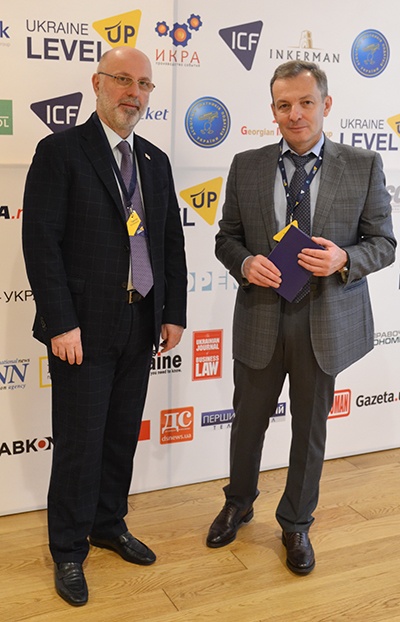 Grigol Katamadze and Givi Topchishvili on the Ukraine Level Up forum. Photo: appu.org.ua
Grigol Katamadze and Givi Topchishvili on the Ukraine Level Up forum. Photo: appu.org.ua– By the way, regarding the environment, why do you think Ukrainian businesses, even the reputable companies, are unable to gain access to foreign capital?
– This question is pretty common. Let me clarify, although this aspect needs a separate deep and detailed discussion. A Ukrainian company (like any other foreign company, let’s say, from France, China, Israel, etc.) can’t expect to access US or British investment institutions.
American investors tend (prefer) to work with US-based companies. So, as a Ukrainian company you can open your rep office in the US (to be clear, I’m talking about a real office, not something offshore existing pretty much only on paper), transfer your technology and IP, build the team and then start approaching US capital. That is the common practice.
As for access to capital internally, it has to come to the country first. When we talk about US and UK Funds in Ukraine, yes, it is an extra layer that makes the cost of capital significantly higher, but that’s the channel to access western capital markets staying within the zone of comfort and competence.
As of now, the number of western investment institutions that have assimilated into the country, built their presence and offices, and see processes from the inside is pretty small. Why? The reasons are the same as we discussed earlier. The environment does not exist that would allow for capacity building, development and integration into the global markets.
– So, you have articulated the timeframe for our new Administration to send the right signals to foreign investors. They have 6–12 months?
– I would not oversimplify. One year could be enough to set a direction. And that is extremely important for your new Administration. Even 12 months is enough to attract new players. All it takes is strategic/systemic work on the part of the President’s team to create actual instruments for implementation and acceleration of the reforms.
Your Taxpayers Association is one of those instruments. The Taxation Code is another one that should help attract capital and ensure that it will operate in civilized, transparent and safe environment. These are the building blocks of the foundation required to systemically build the climate for foreign investment and the capital market.
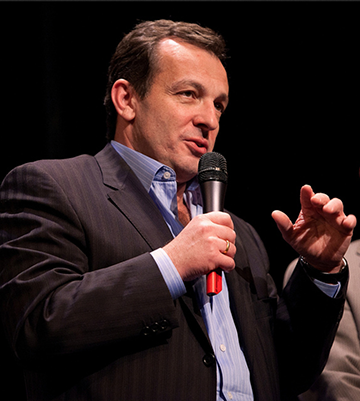 Topchishvili: "In any case change is inevitable. Let’s hope it will be positive and constructive and policy makers will not be drowned in endless discussions". Photo from personal archive of Givi Topchishvili из личного архива
Topchishvili: "In any case change is inevitable. Let’s hope it will be positive and constructive and policy makers will not be drowned in endless discussions". Photo from personal archive of Givi Topchishvili из личного архива– In order to create effective tools which will help attract investors, we need to bring in a qualified workforce to serve as decision makers. Besides the Presidential Administration, Verkhovnaya Rada is another executive body with substantial decision-making power.
– I completely agree. Rada has substantial power.
Early Rada elections have already been announced and we will know the results on the 21st.
In any case change is inevitable. Let’s hope it will be positive and constructive and policy makers will not be drowned in endless discussions. Unfortunately, it is hard to predict the outcome at this time. The pivot points are the executive team and whether they can select and support a pro-Western strategy.
Keep in mind that the main challenges Ukraine is facing are not only internal. The country will have to determine its foreign policy and whether it will focus primarily on building relationships with the US or Europe. How will it continue negotiating with Russia? Will Ukraine favor investors from the US, Asia or Europe?
Zelensky will have to address a number of difficult challenges, some of which are dependent on unrelated external factors, such as Democratic and Republican opposition in the US, as well as relations between the US and Europe, Europe and Asia, the US and China, etc. And there is no way to predict which way the situation will sway.
– What will be early signals for you that positive change in the Ukraine is happening?
– As an investor and businessman who is working with a variety of financial institutions, as well as executive bodies in the US and Ukraine, I rely on my network for information rather than media. Once I start receiving positive feedback and see taxation and legislation systems easing up their grip and moving towards creating more favorable conditions for businesses, I will know that the change is happening. If, instead, I only see press conferences and features in the media, I will remain cautious as will the majority of US and European investors. We will have to go through thorough due diligence before investing in the Ukraine.
– How would you comment on a suggestion for President Zelensky received from a Ukrainian oligarch to follow the “Greek path” and announce default?
– Katamadze: Just to remind you, I spent 25 years building a career as a diplomat; therefore, I will give a diplomatic response to your question.
Negotiations are an extremely difficult process. I believe if the President’s office has a strong team of professionals, they can start the process of negotiating for the debt restructuring.
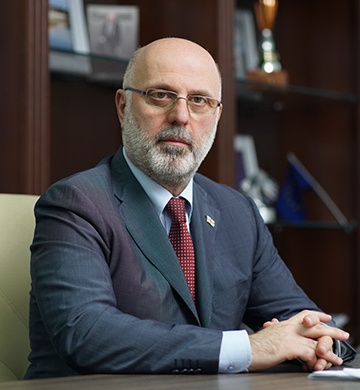 Grigol Katamadze, President of the Ukrainian Taxpayers Association. Photo: appu.org.ua
Grigol Katamadze, President of the Ukrainian Taxpayers Association. Photo: appu.org.ua– Topchishvili: I do not see announcing default in the Ukraine as a positive thing. Ukraine cannot be compared to Greece – a country that is fully integrated into European business as well as the political and financial ecosystems, including state currency. Also, Greece is not at war with a powerful opponent.
In my opinion the talk of a default lacks systemic foundation. It sounds more like a scare tactic for the local people as well as businesses involved in the US and Europe. This only complicates the work of the President’s office and newly elected Rada, who already have a complicated task at hand. If this talk continues, it will only have a discouraging effect for western investors and businesses.
If Ukraine does default, it will become next to impossible for the new administration to resolve the problems we have been discussing for the past hour. This will set your country back, without a doubt.
– Katamadze: Our discussion today was dedicated to attracting foreign investments in the Ukraine. In 2016 I invited Givi as a keynote speaker to the Ukraine Level Up forum for the first time. I wanted Givi to share with 600 Ukrainian businessmen in the audience how Ukraine is perceived in the US as a potential market and business partner and also highlight suggestions and opportunities he has been observing.
I remember vividly that interest in Mr. Topchishvili’s speech was very high. And we made sure to keep the momentum going and follow up with US businesses, Funds and politicians to solidify their interest in the Ukraine.
In 2017–2018 we managed to organize a number of visits hosting high-level US business executives. Unfortunately, these initiatives ran into the “wall” of our sluggish civil servants and bureaucracy. My experience shows that American business has very high interest in our energy sector, agriculture, pharma and infrastructure projects. I’ll tell you more – they are ready to invest millions of dollars. Now in order to attract capital into the country we need to change our approach and make it sound and systemic.
We don’t have to wait for Parliament elections for another half a year, and I believe this is a positive factor. We have a new President, and a new government and Parliament is on the way. Clearly it is insufficient to build trust with foreign investors. So, the way all branches of the new country leadership act during the first three months is critical. Now everybody is waiting. It was evident that the Presidential elections in Ukraine were fair and transparent. It was consistent with the last 15 years of the dynamics within the country; for the third time we witnessed revolutionary changes in politics and society. Now it all depends on the next steps of our new Administration.


 -8 Kyiv
-8 Kyiv


